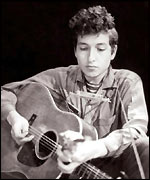
I was recently listening to Bob Dylan's 1st record, which is entitled, appropriately enough Bob Dylan. It's a great record, even though only a few of the songs are Dylan originals; it contains some classic tunes, like House of the Rising Son and a song later associated with the film Oh Brother, Where Art Thou? - Man of Constant Sorrow, not to mention the tune, In My Time of Dying which was later covered by the British band Spacemen 3 (with their trippy version called Come Down Easy.) Dylan's wit, originality, fine musical instincts, and his embracing of such kindred spirits as Woody Guthrie, Robert Johnson, Leadbelly, Ramblin' Jack Elliot, and Jack Kerouac all come shining through. He sounds unpolished, and that is a very good thing; heard in the context of the folk music boom of the 1950s and early 60s, in which folk was smoothed over as easy listening music for mass consumption, Dylan is truly a diamond in the rough. He sounds like someone you'd go to a small folk club, and not on the Ed Sullivan Show, to hear. And in his Song To Woody, Dylan's obvious love for Woody Guthrie and all he stands for comes convincingly across.
Well, as I was listening to it, it occurred to me that, while Bob Dylan" was released in 1962, it was recorded in 1961, the year of my birth. 1961 was the year that John Hammond signed Dylan to a recording contract after seeing him perform in the clubs of lower Manhattan, where Dylan lived after leaving Minnesota.
That same year, on the other side of the ocean, a young British fan happened to walk into a Liverpool record shop to ask the proprietor, Brian Epstein, if he had any copies of the song "My Bonnie," which had been recorded by the then relatively unknown Beatles; Epstein sought the band out, a year later they had a recording contract, and the rest is history.
1961 was the year that a charismatic young president took office; the hopes and dreams of America, and indeed, the world, for peace, freedom, and equality, which were projected onto and associated with Kennedy and Camelot were not unlike the ideals that were associated with the songs of Bob Dylan, particularly those which offered social and political commentary; also, it has been suggested by many that the emergence of the Beatles in America a few years later in 1964 was a means of helping a grieving nation to get over some of its grief and to start feeling happy again. In any event, the 60s were by then well under way.
Dylan, then, gets his start here, and as the 60s unravelled in some surprising ways, so too would Dylan with later turns in his magnificent, unique musical career.
No comments:
Post a Comment